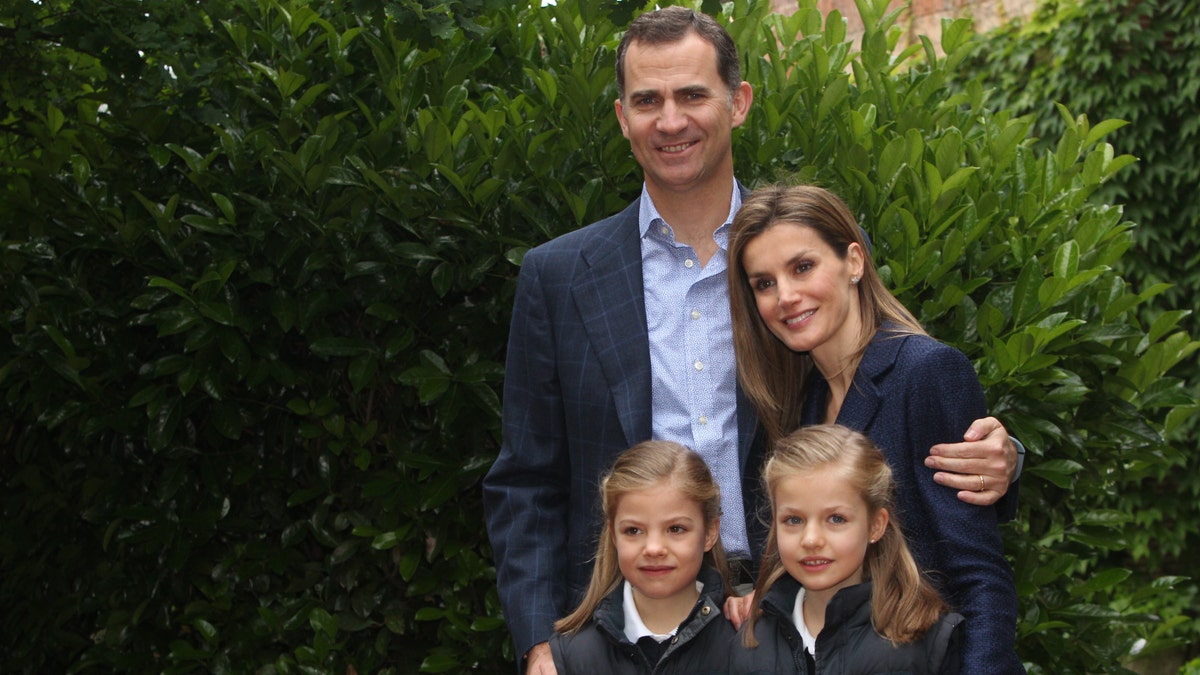
Prince Felipe and Princess Letizia with their daughters Leonor and Sofia on May 22, 2014 in Madrid, Spain. (2014 Casa de S.M. el Rey)
After almost four decades atop the Spanish throne, King Juan Carlos abdicated his role on Monday – setting up the coronation of his son, Crown Prince Felipe, and ushering in a new era for the royalty of the Iberian nation after a recent spate of scandals tarnished its image.
The 46-year-old Felipe has largely been untouched by the corruption allegations and anger from the Spanish public over his family’s lavish lifestyle amid the country’s continuing economic woes and rising unemployment. In abdicating, Juan Carlos said that his son not only “represents stability” for both Spain and its monarchy but also marks a generational change that would open “a new chapter of hope” for the beleaguered nation.
The third child of Juan Carlos and Queen Sofia, Felipe is currently – among his many titles – the Prince of Asturias, and, since his father’s health began to decline, has increasingly taken on a more active role in the monarchy.
Since 1996, he has represented Spain at the swearing-in ceremonies for presidents in Latin America – a historically important role given Spain’s relations with its former colonial holdings – and has taken the place of his father on visits across the Arab world, Australia and Europe, including a high-profile meeting with Russian President Vladimir Putin back in 2002.
In 2011, Felipe performed more royal duties than King Juan Carlos did – a total of 253 functions in Spain and abroad. His main role abroad has been to promote economic and cultural matters that are of import to the Spanish government.
Felipe has a broad career in foreign service, having earned a master’s degree in international relations from Georgetown University. He graduated from officer training at Spanish military academies as a helicopter pilot, lieutenant-colonel in the army and air force and frigate commander in the navy.
The crown prince also has taken a more active role in Spain’s military activities than his counterpart in the United Kingdom, Prince Charles. He has chaired meetings of the chiefs of the Spanish armed forces - a role normally performed by the king – since 2010 and regularly participates in military exercises.
While his bachelorhood was much criticized – he dated a Norwegian swimsuit model and many in the conservative, Catholic country didn’t appreciate the relationship - Felipe eventually married television journalist, Letizia Ortiz Rocasolano, in 2004. They have two daughters, Leonor, 8, and Sofía, 7.
Felipe was also a member of Spain’s Olympic sailing team at the Barcelona Games in 1992—he and his yacht crew finished sixth. He took part in the opening ceremony as the Spanish team's flag bearer.
Despite his popularity among the Spanish public, there are some who see Felipe as undeserving of the throne, as someone who rode on the coattails of his father’s popularity following the end of dictatorship of Francisco Franco in the mid-1970s.
“Golden teen; spoiled by his mother, adored by his sisters, forgotten by the system, surrounded by obliging adults,” El País, the leading Spanish newspaper, wrote on Monday. “Always in the shade of a winning father, who was an active, attractive guy, with people skills, who had sucked politics since childhood and who won the Crown by breaking with Franco’s regime and restoring Spanish democracy.”
Follow us on twitter.com/foxnewslatino
Like us at facebook.com/foxnewslatino
